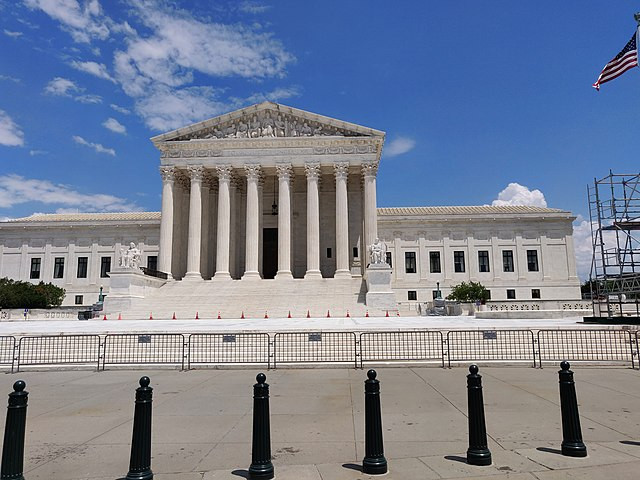The Supreme Court, in a closely divided 5-4 ruling, denied the Trump administration's request to keep nearly $2 billion in foreign aid payments frozen, dealing a setback to the White House's broader effort to overhaul federal spending. The decision allows a lower court ruling to stand, forcing the administration to release the funds while litigation over the aid's legality continues.
Chief Justice John Roberts and Justice Amy Coney Barrett joined the court's three liberal justices-Elena Kagan, Sonia Sotomayor, and Ketanji Brown Jackson-in rejecting the administration's emergency request. Justices Clarence Thomas, Samuel Alito, Neil Gorsuch, and Brett Kavanaugh dissented, with Alito expressing frustration over the court's intervention. "Does a single district-court judge who likely lacks jurisdiction have the unchecked power to compel the Government of the United States to pay out (and probably lose forever) 2 billion taxpayer dollars? The answer to that question should be an emphatic 'No,' but a majority of this Court apparently thinks otherwise. I am stunned," Alito wrote in his dissent, joined by the three other conservative justices.
The ruling stems from a lawsuit challenging the administration's decision to freeze funds allocated under existing USAID and State Department contracts. The White House had sought to withhold the aid as part of a broader effort to reshape federal agencies and curb international spending. Several nonprofit organizations that rely on the funding for global health and humanitarian initiatives sued, arguing that Trump's move bypassed congressional authority over government spending.
The case escalated after U.S. District Judge Amir Ali, an appointee of former President Joe Biden, ruled in February that the administration was violating federal spending laws and ordered the immediate release of the funds. The administration resisted, prompting Ali to issue a stricter directive last week, mandating that the payments be disbursed by midnight Wednesday. The Justice Department then filed an emergency appeal with the Supreme Court, arguing that the government could not meet the deadline and needed time to process the payments.
"The Executive Branch takes seriously its constitutional duty to comply with the orders of Article III courts," the Justice Department stated in its filing. "The government is undertaking substantial efforts to review payment requests and release payments. Officials at the highest levels of government are engaged on this matter."
Roberts, acting alone, issued a brief administrative stay to allow both sides to present their arguments. However, after reviewing the case, the full court denied the administration's motion, effectively compelling the government to proceed with the payments. The ruling does not end the litigation but prevents the White House from delaying the funds indefinitely.
The nonprofit groups challenging the freeze welcomed the court's decision, arguing that the funding is critical to maintaining their operations. "The government comes to this Court with an emergency of its own making," the plaintiffs' attorneys wrote in a filing. They asserted that USAID and State Department officials had deliberately stalled payments rather than working to comply with the district court's order.
The administration's broader strategy to restructure USAID and foreign aid programs has come under intense scrutiny. Court documents revealed that Trump officials have sought to terminate more than 90% of USAID's funding awards, significantly cutting aid to global health programs, disaster relief efforts, and economic development initiatives. A government filing disclosed that nearly 5,800 USAID contracts had been canceled, with only 500 retained, representing an estimated $57 billion in projects.
The decision comes amid mounting tensions between the Trump administration and the judiciary over executive authority and federal spending priorities. The foreign aid dispute is one of several cases that could shape the limits of presidential power in budgetary matters. Legal experts note that while Wednesday's ruling does not definitively resolve the case, it signals that the Supreme Court may be wary of granting the executive branch unchecked discretion over congressionally approved funds.
Steve Vladeck, a Supreme Court analyst and professor at Georgetown University Law Center, described the ruling as "extremely modest" but indicative of the court's divisions. "The unsigned order does not actually require the Trump administration to immediately make up to $2 billion in foreign aid payments; it merely clears the way for the district court to compel those payments, presumably if it is more specific about the contracts that have to be honored," Vladeck said. "The fact that four justices nevertheless dissented-vigorously-from such a decision is a sign that the Court is going to be divided, perhaps along these exact lines, in many of the more impactful Trump-related cases that are already on their way."
The dispute also raises concerns about the broader impact of the administration's spending policies. Organizations that rely on USAID funding argue that the freeze has disrupted global health initiatives and endangered humanitarian projects. The AIDS Vaccine Advocacy Coalition, one of the groups suing the administration, said the funding "advances U.S. interests abroad and improves-and, in many cases, literally saves-the lives of millions of people across the globe."






